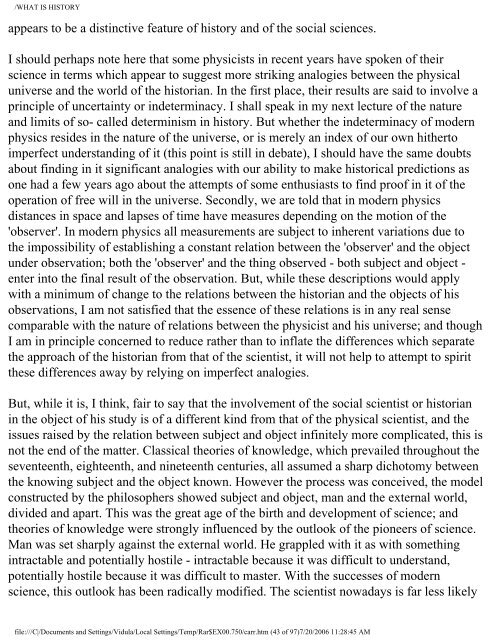What is History / by Edward Hallett Carr - Universal History Library
What is History / by Edward Hallett Carr - Universal History Library
What is History / by Edward Hallett Carr - Universal History Library
You also want an ePaper? Increase the reach of your titles
YUMPU automatically turns print PDFs into web optimized ePapers that Google loves.
WHAT IS HISTORY<br />
appears to be a d<strong>is</strong>tinctive feature of h<strong>is</strong>tory and of the social sciences.<br />
I should perhaps note here that some physic<strong>is</strong>ts in recent years have spoken of their<br />
science in terms which appear to suggest more striking analogies between the physical<br />
universe and the world of the h<strong>is</strong>torian. In the first place, their results are said to involve a<br />
principle of uncertainty or indeterminacy. I shall speak in my next lecture of the nature<br />
and limits of so- called determin<strong>is</strong>m in h<strong>is</strong>tory. But whether the indeterminacy of modern<br />
physics resides in the nature of the universe, or <strong>is</strong> merely an index of our own hitherto<br />
imperfect understanding of it (th<strong>is</strong> point <strong>is</strong> still in debate), I should have the same doubts<br />
about finding in it significant analogies with our ability to make h<strong>is</strong>torical predictions as<br />
one had a few years ago about the attempts of some enthusiasts to find proof in it of the<br />
operation of free will in the universe. Secondly, we are told that in modern physics<br />
d<strong>is</strong>tances in space and lapses of time have measures depending on the motion of the<br />
'observer'. In modern physics all measurements are subject to inherent variations due to<br />
the impossibility of establ<strong>is</strong>hing a constant relation between the 'observer' and the object<br />
under observation; both the 'observer' and the thing observed - both subject and object -<br />
enter into the final result of the observation. But, while these descriptions would apply<br />
with a minimum of change to the relations between the h<strong>is</strong>torian and the objects of h<strong>is</strong><br />
observations, I am not sat<strong>is</strong>fied that the essence of these relations <strong>is</strong> in any real sense<br />
comparable with the nature of relations between the physic<strong>is</strong>t and h<strong>is</strong> universe; and though<br />
I am in principle concerned to reduce rather than to inflate the differences which separate<br />
the approach of the h<strong>is</strong>torian from that of the scient<strong>is</strong>t, it will not help to attempt to spirit<br />
these differences away <strong>by</strong> relying on imperfect analogies.<br />
But, while it <strong>is</strong>, I think, fair to say that the involvement of the social scient<strong>is</strong>t or h<strong>is</strong>torian<br />
in the object of h<strong>is</strong> study <strong>is</strong> of a different kind from that of the physical scient<strong>is</strong>t, and the<br />
<strong>is</strong>sues ra<strong>is</strong>ed <strong>by</strong> the relation between subject and object infinitely more complicated, th<strong>is</strong> <strong>is</strong><br />
not the end of the matter. Classical theories of knowledge, which prevailed throughout the<br />
seventeenth, eighteenth, and nineteenth centuries, all assumed a sharp dichotomy between<br />
the knowing subject and the object known. However the process was conceived, the model<br />
constructed <strong>by</strong> the philosophers showed subject and object, man and the external world,<br />
divided and apart. Th<strong>is</strong> was the great age of the birth and development of science; and<br />
theories of knowledge were strongly influenced <strong>by</strong> the outlook of the pioneers of science.<br />
Man was set sharply against the external world. He grappled with it as with something<br />
intractable and potentially hostile - intractable because it was difficult to understand,<br />
potentially hostile because it was difficult to master. With the successes of modern<br />
science, th<strong>is</strong> outlook has been radically modified. The scient<strong>is</strong>t nowadays <strong>is</strong> far less likely<br />
file:///C|/Documents and Settings/Vidula/Local Settings/Temp/Rar$EX00.750/carr.htm (43 of 97)7/20/2006 11:28:45 AM







